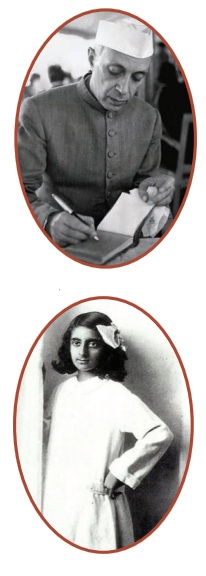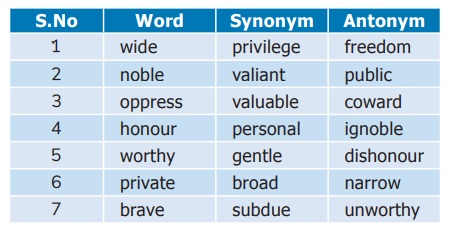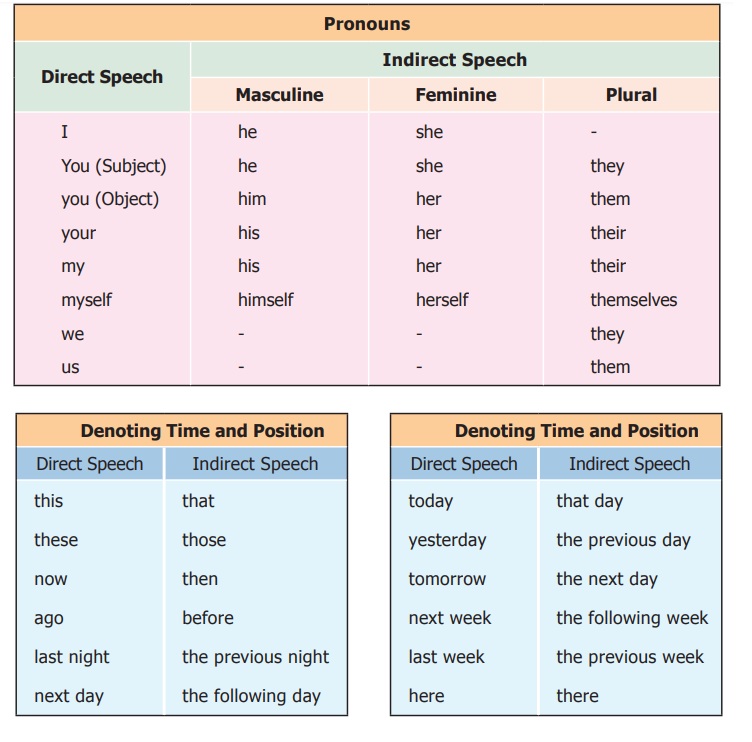English : Unit 7 : Prose : A Birthday Letter – by Jawaharlal Nehru
Warm up
* Have you ever received a personal letter from your friends or relatives?
* If yes, from whom and about what?
* Have you ever written a personal letter to anyone?
* If yes, to whom and about what?

It was the summer of 1928, when Jawaharlal Nehru began writing letters to his young daughter, Indira, who was in Mussoorie at that time. In his letters, he speaks to his daughter on a wide range of topics, including languages, trade, history, geography, science, epics and evolution. When Indira was about to turn 13 in 1930, Nehru started sending her more detailed letters. These letters contained his understanding of the world which he wanted to further impart to his daughter. Even while he was in prison, he wanted to make sure that his child is not devoid of her father’s teachings. Over the next four years, Nehru continuously wrote to his daughter from prison and his words are still inspiring.

The letters written by Nehru from the various prisons in British India to his daughter Indira, were published in 1942 as a book called “Glimpses of World History”. It is a collection 196 letters on world history.
Prose: Question and Answers
* From which prison did Nehru writethis letter?
Nehru wrote this letter from Naini prison.
* Did Nehru send any presents toIndira?
No, Nehru did not send any presents to Indira, but he sent his message in the letter mentioning that were his presents.
* Which historical character inspiredyoung Indira?
The historical character ‘Joan of Arc’ inspired young Indira.
* What helps the ordinary men andwomen to become heroes?
History helps the ordinary men and women to become heroes.
* Who is addressed as ‘Bapuji’?
Mahatma Gandhi is addressed as Bapuji.
* What should the soldiers of Indiarespect?
The soldiers of India should respect India’s honour, which is a sacred trust.
Glossary
sermon (n)- ceremony in which a priest gives a talk on a religious or moral subject
fascinated (adj.)- extremely attracted
deed (n)- a brave or noble act
starving (adj.)- suffering or dying from hunger
oppressed (adj.)- governed in an unfair and cruel way and prevented from having opportunities and freedom
sacred (adj.)- considered to be holy and deserving respect
serene (adj.)- peaceful and calm
unruffled (adj.)- not nervous or worried, usually despite a difficult situation
A. Answer the following questions in one or two sentences.
1. Why could not Nehru send any presents to Indira?
As Nehru was in the prison, he could not send any presents to Indira.
2. What cannot be stopped even by the high walls of prisons?
Nehru’s letters cannot be stopped even by the high walls of prisons.
3. Why did Nehru dislike sermonizing?
Nehru disliked sermonizing because he thought that only talking and discussing is the best way to find what is right or wrong.
4. What does history tell us?
History tells us that whole people become interested in a great cause.
5. What do ordinary men and women usually think of?
Ordinary men and women usually think of their bread and butter, of their children, and their house hold worries and the like.
6. When do ordinary men and women become heroes?
Ordinary men and women become heroes when the history helps them.
7. What does the phrase ‘great drama’ refer to?
The phrase ‘great drama’ refers to the activities of the people of India in the great freedom struggle under Bapuji’s leadership.
8. Why are the freedom fighters under Gandhi not afraid of anything?
The freedom fighters under Gandhi do every thing with no room for secrecy or hiding. So they are not afraid of anything.
B. Answer the following in about 80 – 100 words each.
1. Explain the important elements of Nehru’s letter.
Title : A Birthday letter
Author : Jawaharlal Nehru
Characters : Jawaharlal Nehru and his daughter Indira
Theme : “As we sow, so we reap”
Jawaharlal Nehru was in Naini prison. He was unable to send a birthday present to his young daughter Indira, so he sent a birthday letter to her. He reminded her of Joan of Arc which he had read earlier. Nehru emphasised the significance of history that could make the men and women heroic in their lives. In his view history helps even simple, ordinary people to become heroes. He told her about the great leaders who make them do great deeds. He also tells the magic of Bapuji’s message that had stolen the hearts of millions of Indians. Nehru insisted her on being courageous. He induces the spirit to respect India’s honour which is a secret trust. He cites Bapuji’s leadership that has no secrecy or hiding. So also his daughter should make friends in the light and do nothing secretly. Nehru is quite confident that Indira will grow up into a brave soldier in India’s service.
“Be brave and all the rest follows”.
2. Imagine yourself as Indira and write a reply letter to your father, Nehru for the letter you received on your birthday.
Mussoorie,
October 27, 1930.
My dear dad,
My joy has no bounds to receive your letter. I feel as if you are sitting besides me and talking to you.
It is overwhelming to know how Bapuji’s magic message has stolen the hearts of India’s millions.
Your words are so powerful and I shall respect India’s honour which is a secret trust. Like Bapuji, I shall be truthful and have no room for secrecy or hiding.
With your hearty wish I’ll grow up unafraid serene and unruffled. I’ll be a brave soldier in India’s service fulfilling your dreams.
With much love and deep regards.
Yours loving daughter,
Indira Priyadarshini.
COMMON PARAGRAPH
PARAGRAPH FOR TOPPERS:
Synopsis:
• Introduction
• A birthday without gift
• Belts to practice than to preach
• Letter – a one sided affair
• The ordinary rise to the occasion
• The Bapuji
• No Secrecy
• Conclusion
Introduction:
Jawaharlal Nehru is the first Prime Minister of India. He is a man of ietters. He is well known in the Indian and world history. His daughter Indira Gandhi missed her father’s love. So, he wrote letters to his daughter from prison.
A birthday without gift:
Indira used to receive gifts on her birthday. Nehru was in prison. He could not send her gifts. The present he sent was the mind and spirit.
Belts to practice than to preach:
Nehru hates preaching. He doesn’t like advising. He supports discussion.
Letter – a one sided affair:
A discussion needs atleast 2 people. A letter is a one sided affair. Nehru wants his daughter to think they are having a talk.
The ordinary rise to the occasion:
Ordinary men and women are not heroic. They think of their family worries. When they are interested in great cause, they become heroes. Great leaders inspire them.
The Bapuji:
Gandhiji – Father of our nation has inspired many people. Bapuji had inspired our people to participate in the freedom struggle.
No Secrecy:
It is not easy to select what is right and wrong. Nehru said her not to do anything secretly. Fear is a bad thing. Nehru advised her to be brave.
Conclusion:
Nehru concludes his letter saying many things. Nehru wished his daughter to grow up into a brave soldier in service of India.
“Be brave and serve nation’
PARAGRAPH FOR AVERAGE STUDENTS:
Title : A Birthday letter
Author : Jawaharlal Nehru
Characters : Jawaharlal Nehru and his daughter Indira
Theme : “As we sow, so we reap”
When Jawaharlal Nehru was in Naini prison. He wrote a birthday letter to Indira. He reminds of the historical character Joan of Arc. He emphasises the significance of historical events. History even helps common people to become heroes. Great leaders inspire the ordinary people to do noble deeds. He admires Bapuji whose magic message has stolen the hearts of India’s millions working with no secrecy or hiding. Nehru wishes Indira to do anything not secretly. If she does so she will grow up unafraid serene and unruffled, whatever may happen. Finally he blesses her that she may grow into a brave soldier in India’s service.
“Openness can bring happiness, courage and success”.
PARAGRAPH FOR LATE BLOOMERS:
• Nehru writes a letter to his daughter Indira from Naini prison.
• Nehru said that his messages in the letter were his presents.
• The letter was the gift of the mind and the spirit.
• He liked discussing with his daughter than sermonizing.
• The historical character ‘Joan of Arc’ inspired young Indira.
• When people became interested in a great cause, history helps the ordinary men and women to become heroes.
• He mentioned Bapuji efforts in the freedom struggle.
• He advised Indira not to do anything in secret.
• Nehru wished his daughter to grow up into a brave soldier in the service of India.
C. Match the words with correct Synonym and Antonym from the table.

Answer:
Word : Synonym × Antonym
1. wide : Broad × Narrow
2. noble : gentle × Ignoble
3. oppress : subdue × Freedom
4. honour : privilege × Dishonor
5. worthy : valuable × Unworthy
6. private : personal × Public
7. brave : valiant × coward
Think and answer.
What is the difference between an opinion and a fact?
* An opinion is one’s feelings or thoughts about somebody/something.
* A fact is a piece of information that can be proved to be true.
D. Identify, whether the following statements are of OPINION or FACT
1. On your birthday you have been in the habit of receiving presents and good wishes. (Opinion/Fact) Answer : Fact
2. I have liked my talks with you. (Opinion/Fact) Answer : Opinion
3. The best way to find what is wrong and right is by discussing. (Opinion/Fact) Answer : Opinion
4. A letter can hardly take the place of a talk. (Opinion/Fact) Answer : Opinion
5. For the desire to hide anything means that you are afraid. (Opinion/Fact) Answer : Fact
LISTENING
E. Listen to the dialogue and answer the following questions.
A Dialogue between Brothers
Raghav: Hi Aadhav! I need to discuss something important with you.
Aadhav: Hi Raghav! I am free now. Come on. Let us discuss.
Raghav: Do you remember that coming April 2nd is our parents’ wedding anniversary?
Aadhav: Thank you for reminding me, Bro. I have almost forgotten that. How shall we celebrate it?
Raghav: Shall we plan for a surprise celebration?
Aadhav: Yes, of course, Bro.
Raghav: How about inviting our friends and close relatives for the party to surprise our parents?
Aadhav: Yeah. That would be a real surprise! Shall we also have cake cutting?
Raghav: Yes, we shall. But, we have to do something unique. What else shall we do then?
Aadhav: Why don’t we make our parents plant a sapling as a part of the celebra-tion?
Raghav: That’s a good one! I know a person who owns a nursery garden. I’ll buy mango sapling and we’ll make our parents plant it.
Aadhav: Great, it will be a memorable one. I have saved some money. Let’s make use of it for the arrangements.
Raghav: Let me also contribute my savings to make this celebration useful and memorable.
1. Aadhav and Raghav are _____________.
a. brothers
b. friends
c. colleagues
d. classmates
2. The brothers are planning to celebrate their ___________ wedding anniversary.
a. uncle’s
b. parents’
c. grandparents’
d. sister’s
3. The wedding anniversary is on _____________.
a. March 2nd
b. April 2nd
c. May 2nd
d. June 2nd
4. As part of the celebration, the brothers have planned to make their parents to ____________.
a. visit an orphanage
b. donate some money
c. plant a mango sapling
d. conduct a game
5. State whether the statement is true or false.
The brothers have decided to borrow money for the wedding anniversary celebration.
Answer : False
READING
Anne Frank’s Diary Entry about her birthday.
Sunday, June 14, 1942
Dear Kitty,
I hope I will be able to confide everything to you(the diary), as I have never been able to confide in anyone, and I hope you will be a great source of comfort and support.
I’ll begin from the moment I got you, the moment I saw you lying on the table among my other birthday presents. (I went along when you were bought, but that doesn’t count.)
On Friday, June 12, I was awake at six o’ clock, which isn’t surprising, since it was my birthday. But I’m not allowed to get up at that hour, so I had to control my curiosity until quarter to seven. When I couldn’t wait any longer, I went to the dining room, where Moortje (the cat) welcomed me by rubbing against my legs.
A little after seven I went to Dad and Mom and then to the living room to open my presents, and you were the first thing I saw, maybe one of my nicest presents. Then a bouquet of roses, some peonies and a potted plant. From Dad and Mom, I got a blue blouse, a game, a bottle of grape juice, a puzzle, a jar of cold cream and a gift certificate for two books. I got another book as well, Camera Obscura (but my sister Margot already has it, so I exchanged mine for something else), a platter of homemade cookies (which I made myself, of course, since I’ve become quite an expert at baking cookies), lots of candy and a strawberry tart from Mother.
Then Hanneli my classmate came to pick me up, and we went to school. During recess I passed out cookies to my teachers and my class, and then it was time to get back to work. As it was my birthday, I got to decide which game my classmates would play, and I chose volleyball. Afterward they all danced around me in a circle and sang “Happy Birthday.”
F. Answer the following questions based on the given reading passage.
1. What is the name of her diary?
The name is Anne Frank’s Diary Entry.
2. Why did Anne want to exchange the book ‘Camera Obscura’?
Anne wanted to exchange the book Camera Obscura’ as her sister Margot already had it.
3. Who baked the homemade cookies?
Anne Frank herself baked the homemade cookies.
4. What game did Anne choose to play?
Anne chose volley ball to play.
5. Which gift did Anne value the most?
Anne valued the gift from Kitty the most.
SPEAKING
G. Imagine you are going to celebrate your forthcoming birthday at an orphanage/old-age home.
Deliver a short speech about your birthday celebration by using the following hints.
* The reasons for choosing an orphanage/old-age home.
* The people who accompany you.
* The food which you are going to offer them.
* The useful gifts/articles which you are going to give them.
* Other events like cake cutting, conducting games etc.
“Be brave and all the rest follows”.
Short Speech :
Respected Headmaster, teachers and my dear friends
I would like to deliver a short speech about celebrating my birthday in an orphanage. It is really an interesting day.
I decide to do something different this year. I decide to celebrate my birthday at an orphanage. My parents are really happy with the idea.
As we enter the place, we will be welcomed by a friendly old lady. There are many children who are young to me and some of them are of my own age. They too will be excited like me.
I will cut the cake. All will sing the birthday chorus and greet me. I will gift all them with little presents which I have bought for them. We will enjoy a lot with song and dance.
Children of my age will be very friendly, we will talk about our favourite shows and hobbies. Some of them will show their talents by playing guitar and drums. The children will be happy.
I will be really happy that I will spend some time pleasantly with such wonderful children whom God loves so much.
Thank you one and all.
WRITING
Developing Hints
Developing hints is developing the phrases into full sentences and then into a meaningful coherent paragraph.
Points to remember:
* Read the hints twice or thrice carefully.
* Understand the passage well.
* Jot down the points.
* If the events in the passage are in present tense, write the story in the past tense.
* Arrange the matter in two or three paragraphs.
* Give a suitable title.
H. Write a meaningful paragraph using the hints given below.
Mahesh – celebrates – 14th birthday – an old-age home – family, friends – informs home in advance – delegates tasks – friends buy things necessary – arrives home early – decorates place – balloons, colour papers – inmates gathered – cuts cake – sing song, claps – distributes cakes – expresses his feelings – gets blessings – offers things – bedsheets, footwear etc. needed – fun, entertainment – happy and content.
Answer:
Birthday Celebration
There was a boy named Mahesh. He wanted to celebrate his birthday at an old home. It was his 14th birthday. His parents agreed with his suggestion.
Mahesh informed his friends and relatives well in advance. He delegated various tasks to his friends. His friends became active and they bought all the necessary things.
On that day they arrived early. They decorated with balloons and colour papers. Mahesh came there with his parents. Mahesh cut his birthday cake amidst a grand applause. There were singing and clapping.
Mahesh expressed his joyful feelings. He gave the cakes to all. He offered the aged people bedsheets, foot wears etc. He got the blessings from the old people at home. There was enough fun and entertainment in the function. The inmates thanked Mahesh for his kindness and goodwill. All were happy and contented.
Grammar
Determiners
Observe the nouns in the following sentences and words before them.
* An apple is a healthy fruit.
* Two cats have drunk a bowl of milk.
* My father has many cars.
Determiners are the words that introduce a noun and provide some information about it (but do not describe it).
Determiners are followed by a noun.
* The ball * Five cats
* His son * Some students
Types of Determiners

* The quantifiers all, any, enough, less, a lot of, more, most, no, none of, some etc., are used with both countable and uncountable nouns.
* The quantifiers both, each, either, fewer, neither etc., are used only with countable nouns.
A. Choose the Correct Determiner
1. Could you bring me those tools I left in the garden? (this, those, these)
2. the Earth revolves around the sun. (the, a, an)
3. I found a one rupee coin in the playground while playing. (a, an, the)
4. There aren’t many students in the library. (much, many, a lot)
5. It was an unforgettable experience. (a, an, the)
6. I haven’t got any pictures in my bedroom. (some, any, many)
7. He said that he wanted to become an engineer. (a, an, the)
8. Kokila gave a pen to each child in the classroom on her birthday. (any, all, each)
9. I’ve got to solve all math problems before I go to sleep. (all, some, any)
10. India is the largest democracy in the world. (a, an, the)
11. My father doesn’t drink much coffee. (much, many, a lot)
12. I always keep some money in my wallet for emergencies. (any, every, some)
13. This year we are celebrating my sister’s second birthday. (a, two, second)
14. I have three pencils with me. (a, three, third)
15. ‘What is that noise?’ I think it is an aeroplane. (a, an, the)
Reported Speech
Look at the following sentences
She said, “I have won the first prize.” (Direct Speech)
She said that she had won the first prize. (Indirect Speech)
* In the first sentence, the reporter conveys the message of the girl using her actual words i.e., (“I have won the first prize.”)
* In the second sentence, the reporter conveys her message but in his own words without any change in the meaning. (She said that she had won the first prize.)
* In direct speech, we reproduce the actual words of the speaker. We place spoken words within inverted commas (“ ”).
* In indirect speech (also called Reported Speech), we report the words of the speaker with a few changes.
Key Terminology
Direct Speech
She said, “I have won the first prize.”

Reporting Statements
We make the following changes when reporting the statements.
– Change the pronouns
– Reporting verb followed by ‘that’
– Change the tense, time and place
(e.g) Kowsalya said, “We watched a film yesterday.”
Kowsalya said that they watched a film the day before.

Reporting Imperatives
To report an imperative, use the pattern –
request/order/suggest + someone + to infinitive
(e.g.)Karthi said to Ram, “Please, switch on the fan.”
Karthi requested Ram to switch on the fan.
Reporting Questions
When reporting questions, we use the pattern:
asked/ wanted to know + question word + pronoun + verb
(e.g.) She said to me, “Where did you go?”
She asked me where I went.
Note: If the ‘wh’ question is missing, if or whether is added.
(e.g). Praveena asked, “Have you watered the plants?”
Praveena asked if/whether I had watered the plants.
Sometimes it is not necessary to report everything that is said word by word. It may be better to use ‘reporting verbs’ which summarise what was communicated.
Below are some of the most commonly used verbs of this kind.
accept, advise, apologise, ask, assure, blame, complain, complement, congratulate, explain, greet, hope, invite, offer, order, persuade, promise, remind, regret, say, suggest, tell, thank, answer, warn, encourage, regret, sympathize, refuse, instruct
Remember these rules of change

B. Observe the following call-outs. Reporter (C) has reported the sentences of Speaker (A). Now, help Reporter (C) report the rest of the sentences of Speaker (A).
Speaker: I have to go.
Questioner: What did he say?
Reporter: He said that he wanted to go.
Speaker: Can you hear me?
Questioner: What did she say?
Reporter: She asked if you could hear her.
Speaker: Consult the doctor.
Questioner: What did he say?
Reporter: He advised you to consult the doctor.
Speaker: I won’t go to the party.
Questioner: What did he say?
Reporter: He said that he wouldn’t go to the pasty.
Speaker: When did you come?
Questioner: What did she say?
Reporter: She asked when I had come
Speaker: Don’t touch the wire.
Questioner: What did she say?
Reporter: She warned me not to touch the wire.
Speaker: Bring some water, please
Questioner: What did he say?
Reporter: He requested me to bring some water, (request)
Speaker: Will you help me?
Questioner: What did he say?
Reporter: He asked if I would help him. (ask)
C. Report the following sentences.
1. Pushpa said, “Do not spoil the eco-system.”
Answer: Pushpa advised not to spoil the eco-system.
2. Ebin said, “Have you booked the tickets to Delhi?”
Answer: Ebin asked if he had booked the tickets to Delhi.
3. Rehman said to Tilak, “When are we leaving to our native?”
Answer: Rehman asked Tilak when they were leaving to their native.
4. Maha said, “Lakshan, you should get up early in the morning.”
Answer: Maha told Lakshan that he should get up early in the morning.
5. Gladin said to his mother, “Can you, please, buy me a hot-chocolate?”
Answer: Gladin requested his mother if she could buy him a hot chocolate.
6. “Tomorrow I have to take a test in English”, said Sudha.
Answer: Sudha said that she had to take a test in English the next day.
7. Amali said to her sister, “I need your help to arrange the books in the shelf.”
Answer: Amali told her sister that she needed her help to arrange the book in the shelf.
8. “Why don’t you use crayons for colouring?” said Prabhu to his son.
Answer: Prabhu asked his son why he didn’t use crayons for colouring.
Project
D. Write a Diary entry each day for a month and compile them into a book. You may also name your diary as Anne Frank did.
Diary writing is one of the most personal and informal categories of writing. A diary writing can be based on an experience, a scene, a description or narration of certain event or any other thing or activity that the writer considers worth writing in his/her personal diary.
The style and tone is generally informal and personal. However, it depends on the subject. You can freely express your viewpoints and feelings. As the diary is writer’s personal document, the diary entry doesn’t need any signature.
The more frequently you write entries in your diary, the more you will enjoy doing it and the more you will learn from them.















